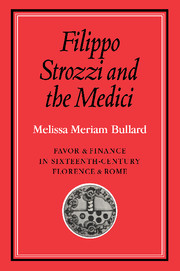6 - War finance and Florentine public funds
Published online by Cambridge University Press: 07 October 2011
Summary
Before considering papal war finances and Filippo's role in them as conduit between the Florence and Rome depositories, we must first turn our attention to the broader context of papal banking and the financial predicament which engulfed the Medicean papacy. The papacy in the early sixteenth century faced the same fiscal problems we have already encountered in the Depository General, only on a much larger scale. Although the popes had regular sources of income from taxes on ecclesiastical possessions in all parts of the Christian world, substantial revenues from the Papal States, and income from the sale of offices and indulgences, these monies arrived at Rome too slowly and unpredictably to alleviate immediate needs for cash. The Introitus accounts illustrate how annates or common services and decimal payments dribbled in often months late. The distance some monies had to travel whether as a cash shipment or in a letter of exchange added to the delays. Once the papal collector in Spain had managed to force payment which was sometimes years in arrears, it still took over four months to transfer the money from Seville through Lyons to Rome. Spanish monies collected by Giovanni Poggio from September 1532 through December 1533 were not receipted in Rome until the end of May 1534. Even the sale of benefices and offices, which became an increasingly productive source of revenue, was sporadic and sometimes at a standstill.
- Type
- Chapter
- Information
- Filippo Strozzi and the MediciFavor and Finance in Sixteenth-Century Florence and Rome, pp. 119 - 150Publisher: Cambridge University PressPrint publication year: 1980

